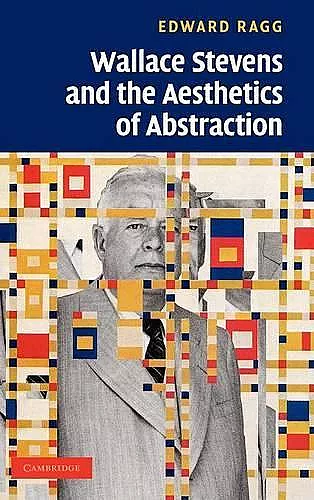Wallace Stevens and the Aesthetics of Abstraction
Format:Hardback
Publisher:Cambridge University Press
Published:15th Jul '10
Currently unavailable, and unfortunately no date known when it will be back

This book embraces philosophical and artistic perspectives, analyzing Stevens's place within Modernist debates concerning literature, painting, and representation.
By tracing the poet's interest in abstraction from Harmonium through to his later works, Edward Ragg presents a new, revisionist study of the work of Wallace Stevens. This book embraces philosophical and artistic perspectives, analyzing Stevens's place within and resistance to Modernist debates concerning literature, painting, representation and 'the imagination'.Edward Ragg's study was the first to examine the role of abstraction throughout the work of Wallace Stevens. By tracing the poet's interest in abstraction from Harmonium through to his later works, Ragg argues that Stevens only fully appreciated and refined this interest within his later career. Ragg's detailed close-readings highlight the poet's absorption of late nineteenth century and early twentieth century painting, as well as the examples of philosophers and other poets' work. Wallace Stevens and the Aesthetics of Abstraction will appeal to those studying Stevens as well as anyone interested in the relations between poetry and painting. This valuable study embraces revealing philosophical and artistic perspectives, analyzing Stevens' place within and resistance to Modernist debates concerning literature, painting, representation and 'the imagination'.
'Ragg's book shows what can be done by scrupulous scholarship on a carefully chosen and crucial individual feature of a poet's oeuvre. Ragg brings to the topic of abstraction an enviable combination of elegant clarity, subtle and imaginative readings, the construction of an engaging and rich dialectic within Stevens' own career and incisive philosophical analysis that provides a significant conceptual place for the role of idealization in poetry.' Charles Altieri, University of California, Berkeley
'Edward Ragg's Wallace Stevens and the Aesthetics of Abstraction is a major contribution to Stevens studies. Ragg is an internationally renowned Stevens expert. In this book he approaches head on the vexed question of 'abstraction' in Stevens' poetry. As Ragg shows, Stevens' notions of abstraction and his practice of 'the aesthetics of abstraction' evolved over the years, from book to book of poetry and from essay to essay as he tried to account in the latter for his poetic practice. The evolution was an attempt to strike the right balance between abstraction and reference to things, 'the pans above the stove, the pots on the table, the tulips among them'. Particularly valuable is the detailed account of Stevens' tendency to abandon the specific idiom of abstraction that dominates the poetry of the early 1940s and its replacement as the decade wore on with a poetry that is still abstract but no longer so much uses just one repertoire of terms. Dr. Ragg's investigation is carried on by way of brilliant close reading of difficult poems, for example the admirable readings of 'Montrachet-Le-Jardin' and 'The Pure Good of Theory'. Anyone interested in Stevens' poetry should have this superb book.' J. Hillis Miller, University of California, Irvine
'Ragg's is the rare book that combines intellectual rigor with literary sensitivity in all areas, harmonizing the discussion of ideas and debates with well-informed, multifaceted, and sensitive readings of poems. 'It Must Bring Pleasure' and it does.' Beverly Maeder, University of Lausanne
'Ragg's meticulous scholarship will surely inspire further debate on this vexed and central question of Stevens studies …' The Journal of American Studies
'Ragg's work has garnered much deserved praise, and it will be of use both to readers of Stevens and to anyone working on the relationship between poetry and painting … Ragg's work is exceptionally well done … and his claim for the central importance of painterly abstraction in the development of Stevens' poetics is established compellingly. The majority of Ragg's focus falls on Stevens' works from 1923 to 1945, and the close analysis he offers of 'Landscape with Boat' from Parts of a World … is particularly useful for the classroom as well as scholarship. This reviewer has used Ragg's approach for seminars with good effect, and this may be the lasting contribution of his work. Instructors teaching Stevens' poetry will find [this] a highly useful resource during lecture preparation, especially given Ragg's tendency to move from critical assertions to the accumulation of evidence through extensive close reading.' James Gifford, The Year's Work in English Studies
'[This book] is tightly argued throughout, drawing upon Stevens' essays and letters to illustrate the poet's engagement with modernist art theory and philosophy, and to map his evolving sense of an abstract aesthetic … Ragg makes a particularly strong case for considering Stevens' gustatory imagination. Ever alert to the pleasures of eating and drinking in Stevens' poetry, [he] argues that the physical and sensual 'are often the sites for the catalysis of his abstract imagination', adding that 'the tendency to oppose the sensual to the abstract denies readers insight into this aspect of Stevens' work'.' Alex Runchman, Irish Journal of American Studies
- Winner of A Choice Outstanding Academic Title 2011
ISBN: 9780521190862
Dimensions: 229mm x 152mm x 16mm
Weight: 520g
262 pages